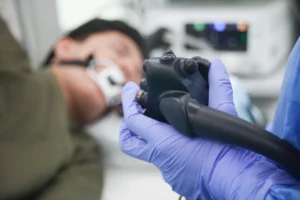Key pointers at a glance:
- Occasional bloating or stomach upset can be harmless, often linked to food or stress.
- Persistent or severe gastric pain may point to ulcers, gastritis, or other conditions.
- Warning signs like vomiting blood, black stools, or unexplained weight loss should never be ignored.
- A gastroenterologist can help identify the underlying cause through proper evaluation.
Everyday Gastric Discomfort, What’s Normal?
Most of us have felt that heavy, uncomfortable sensation after eating too much or too quickly. Common indigestion (also called dyspepsia) may bring on:
- Bloating
- Belching
- Mild stomach cramps
- A burning feeling in the upper abdomen
These symptoms are usually short-lived and improve with rest, smaller meals, or over-the-counter remedies. Stress, caffeine, alcohol, and certain foods can all trigger occasional indigestion.
When Gastric Pain Could Signal Something More Serious
Not all stomach discomfort should be brushed aside. Pain that lingers, worsens, or returns regularly may suggest conditions beyond simple indigestion, such as:
- Gastritis: Inflammation of the stomach lining, often linked to infection, certain medications, or alcohol.
- Peptic ulcers: Painful sores in the stomach or duodenum that can cause sharp or burning pain.
- Gastroesophageal reflux disease (GERD): Chronic acid reflux leading to chest or stomach discomfort.
- Stomach or duodenal issues from H. pylori infection: A bacterial infection that can lead to ulcers if untreated.
Red Flag Symptoms You Shouldn’t Ignore
While mild gastric pain may pass, some warning signs call for medical review without delay:
- Vomiting blood or material that looks like coffee grounds
- Black or tarry stools
- Unexplained weight loss
- Difficulty swallowing
- Severe or persistent abdominal pain
- Nausea and vomiting that do not ease up
These could indicate bleeding ulcers, infections, or even early signs of more serious digestive conditions.
Why Seeing a Specialist Matters
Self-medicating for gastric pain might provide temporary relief, but it doesn’t address the cause. A gastroenterologist can carry out investigations such as endoscopy, ultrasound, or lab tests to pinpoint the issue. Early evaluation can:
- Rule out serious conditions
- Provide appropriate treatment
- Prevent complications from untreated ulcers or infections
Lifestyle Choices That Can Help Reduce Indigestion
Simple changes often go a long way in easing mild gastric discomfort:
- Eat smaller, more frequent meals
- Limit caffeine, alcohol, and spicy or oily foods
- Avoid lying down immediately after eating
- Manage stress through relaxation or regular exercise
- Stop smoking, which can aggravate stomach lining
If symptoms persist despite these measures, professional advice is needed.
FAQs About Gastric Pain
1. How do I know if my gastric pain is just indigestion?
If the discomfort happens occasionally after overeating or having rich foods, and it settles on its own, it may just be indigestion.
2. Can stress really cause stomach pain?
Yes. Stress can increase acid production and slow digestion, contributing to bloating or cramping.
3. When should I see a gastroenterologist?
Seek care if your pain is frequent, severe, or comes with symptoms like weight loss, vomiting blood, or difficulty swallowing.
4. What tests might be done for gastric pain?
Depending on your symptoms, tests may include an endoscopy, breath tests for H. pylori, or imaging studies.
Concerned About Persistent Gastric Pain?
Don’t ignore ongoing stomach discomfort, especially if it interferes with daily life.
At GastroClinic, Dr Lin Cui Li, American Board-Certified Gastroenterologist and Hepatologist, provides care for a wide range of digestive conditions. Located at Mount Elizabeth Medical Centre, our clinic offers evaluation and management for patients with persistent gastric pain and related symptoms.
- 3 Mount Elizabeth, #06-10, Mount Elizabeth Medical Centre, Singapore 228510
- Call us at 6443 8166
- WhatsApp 8040 7375
- Book an Appointment













